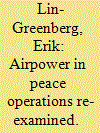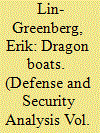|
|
|
Sort Order |
|
|
|
Items / Page
|
|
|
|
|
|
|
| Srl | Item |
| 1 |
ID:
106780


|
|
|
|
|
| Publication |
2011.
|
| Summary/Abstract |
This article examines the role of airpower in peace operations and asserts that, when carried out as part of a multidimensional operation, aviation is a force multiplier that enhances the effectiveness of typically undermanned peace operations forces. Emerging state and commercial actors, even if equipped only with relatively low-tech aircraft, are able to provide intelligence, airlift, information operations and armed support to peace operations. The article examines media reports, academic publications and openly available government and UN documents to assess potential roles for peace operations and to identify political and logistical challenges that must be overcome in deploying airpower.
|
|
|
|
|
|
|
|
|
|
|
|
|
|
|
|
| 2 |
ID:
167282


|
|
|
|
|
| Summary/Abstract |
Can a leader reduce the audience costs imposed for backing down completely on a threat by opting instead to ‘back up’ to a less hawkish policy? Current research examines the political repercussions of making a threat and then taking no action at all. Real world leaders, however, often ‘back up’ and implement policies that involve some action – for instance, imposing sanctions after threatening military force, rather than backing down entirely. This article argues that audience costs can be mitigated through policy substitution: backing up to less hawkish policies – that reduce inconsistency between a leader’s words and deeds – may reduce audience costs. A series of original survey experiments finds support for the argument and demonstrates that the population treats inconsistency as a continuum. The findings have implications for domestic politics and crisis bargaining. Domestically, a leader who backs up faces lower audience costs and is seen as more competent than one who backs down. Yet those on the receiving end of threats are less likely to believe the future threats of a foreign leader who has previously backed up or backed down. Backing up therefore degrades the credibility of crisis signals by making it difficult for rivals to distinguish between credible threats and those that will be backed up.
|
|
|
|
|
|
|
|
|
|
|
|
|
|
|
|
| 3 |
ID:
097077


|
|
|
| 4 |
ID:
161507


|
|
|
|
|
| Summary/Abstract |
Can seemingly benign deployments of armed forces on military operations other than war (MOOTW) – such as humanitarian relief and anti-piracy missions – exacerbate security dilemmas? The security dilemma holds a central role in international relations theory, but existing analyses overlook whether non-traditional security operations drive security competition if perceived as threatening. Despite increased MOOTW participation throughout Asia, scant attention has been paid to the broader strategic implications of these operations. This article proposes a hypothesis in which MOOTW participation exacerbates security competition by revealing military capabilities and providing states with skills that make offensive action easier. The article tests this hypothesis by process tracing events surrounding Japan’s post-3/11 earthquake response. The findings suggest that MOOTW participation intensifies long-term security competition, especially when rising powers are involved.
|
|
|
|
|
|
|
|
|
|
|
|
|
|
|
|
| 5 |
ID:
180222


|
|
|
|
|
| Summary/Abstract |
How do emerging technologies that erode governments’ near-monopolies on intelligence information affect public support for leaders and their foreign policies? Technologies—like imagery satellites—that were once the domain of state governments are now increasingly available to commercial and private actors. As a result, non-government entities can now exercise the disclosure decision, publicly divulging information whose release was once controlled by states. We argue that non-government entities with access to these technologies serve as alternative information sources that can verify government claims or reveal activities governments have not previously acknowledged. Using original survey experiments we find that commercial satellite imagery can serve as an informational cue that shifts public opinion, and, depending on its content, either attenuates or bolsters the effect of similar cues from government sources. The findings advance debates over secrecy in international relations and on the effect of emerging technologies in the security domain.
|
|
|
|
|
|
|
|
|
|
|
|
|
|
|
|
| 6 |
ID:
188887


|
|
|
|
|
| Summary/Abstract |
Russia’s invasion of Ukraine has led to a resurgence of policy attention toward reassurance—an attempt to increase an ally’s feeling of security from external threat. In our recent article, “Trivial Tripwires? Military Capabilities and Alliance Reassurance,” we assess how states can most effectively reassure their allies. We introduce a new typology of reassurance measures based on the interaction of capability and resolve, and test it using case studies and data from original expert surveys. We find that in northeastern Europe, high-resolve signals (for example, tripwire forces) are not viewed as any more reassuring than high-capability, low-resolve signals (for example, forces stationed offshore). Put differently, high resolve cannot offset low capability.
|
|
|
|
|
|
|
|
|
|
|
|
|
|
|
|
| 7 |
ID:
188214


|
|
|
|
|
| Summary/Abstract |
How can states most effectively reassure their allies? Existing studies assessing signals of commitment focus on the role of resolve in making assurances credible. This sidelines important questions about the role of capability. We argue that reassurance effectiveness is the product of both capability and resolve, and suggest that high resolve cannot offset low capability. We introduce a new typology of reassurance measures based on the interaction of military capability and resolve, and test which types of measures are most reassuring using an original survey fielded on European foreign policy experts and a case study of US and North Atlantic Treaty Organization reassurance initiatives in the Baltics. We find that high-resolve, low-capability signals such as tripwire forces in allied territory are not viewed as any more reassuring than high-capability, low-resolve signals such as forces stationed offshore. Our study casts doubt on the reassurance value of tripwires and contributes to scholarship on interstate signaling.
|
|
|
|
|
|
|
|
|
|
|
|
|
|
|
|
| 8 |
ID:
188822


|
|
|
|
|
| Summary/Abstract |
How do drones affect escalation dynamics? The emerging consensus from scholarship on drones highlights increased conflict initiation when drones allow decisionmakers to avoid the risks of deploying inhabited platforms, but far less attention has been paid to understanding how drones affect conflict escalation. Limited theorization and empirical testing have left debates unresolved. I unpack the underlying mechanisms influencing escalation decisions involving drones by proposing a logic of remote-controlled restraint: drones limit escalation in ways not possible when inhabited assets are used. To test this logic and explore its instrumental and emotional microfoundations, I field "comparative wargames." I immerse national security professionals in crisis scenarios that vary whether a drone or inhabited aircraft is shot down. I validate wargame findings using a survey experiment. The wargames shed light on the microfoundations of escalation, highlight limits of existing theories, and demonstrate the utility of comparative wargaming as an IR research tool.
|
|
|
|
|
|
|
|
|
|
|
|
|
|
|
|
|
|
|
|
|